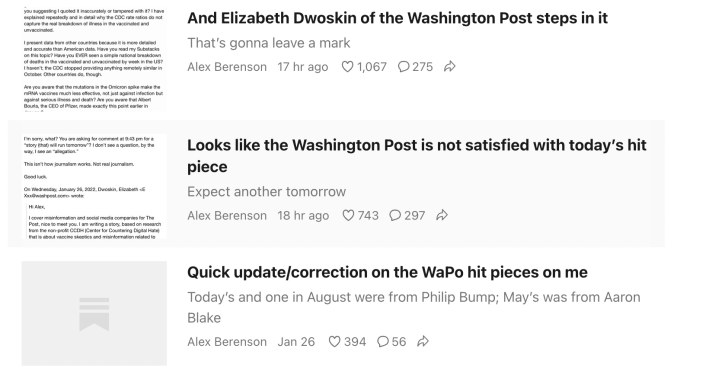By now, people know the deal with Substack. It is a digital publisher where some writers make some money writing about things they are knowledgeable about, and where certain writers of the intellectual dark web publish work that ranges from being stupid and dishonest to actively hateful and harmful. Substack, which likes to claim it is merely a platform and not a publisher, has long defended its right to not interfere with what its writers publish, no matter how false or destructive their ideas may be. And yet, every few months, some atrocious Substack post will breach containment and the general news-consuming public will say, Huh, maybe Substack shouldn't let people publish this crazy shit on their website. This is the point at which one in a collection of bosses at Substack will ride out to make increasingly silly arguments about why, for example, letting a doctor advise readers to inhale peroxide is not only noble and righteous, but crucial to the survival of democracy.
Today, the Guardian reported that anti-vaxxers like Alex Berenson make millions of dollars from their Substack newsletters, setting off this cycle anew. The Substack exec who hopped into the ring to respond this time was VP of communications Lulu Cheng Meservey. She posted about how Substack doesn't "make moderation decisions based on public pressure or PR considerations." This implies, of course, that they do moderate content based on other considerations—of course they do. Substack has its own set of content guidelines that it uses to make decisions about what is and is not fit for publication. But all this has been said; what's interesting about Cheng Meservey's thread is her mystifying use of figurative language.
I read things on Substack all the time that I personally disagree with. Open debate is not always comfortable. But neither, for that matter, is the sea.
— Lulu Cheng Meservey (@lulumeservey) January 26, 2022
Her confusing sea metaphor and questionable understanding of Harry Potter magic aside, she seems to be missing that Substack is the dark corner where bad ideas go to be safe from questioning. Substack, more than anything else, is a home for certain people who want to publish the kind of lies or bigotry or petty whining that no other self-respecting outlet would publish. It was in fact years of public ridicule that drove Berenson out of places like The New York Times and into the safe space that now exists for him at Substack, where he is making huge sums of money spreading COVID-19 denialism among his large subscriber base. What exactly does that say about examination and mockery's ability to defeat bad ideas?
Substack's execs probably aren't going to change their mind about allowing Berenson to use and profit from their platform. At this point, they really can't, given that Substack explicitly sells itself as an alternative to other media publishers and platforms who do attempt, however messily, to keep people like Berenson as far away from an audience as humanly possible. This is just what Substack is: a place that makes it possible for one of the dumbest guys in the world to make a million dollars by convincing a lot of people to actively endanger themselves. Substack gets a nice cut out of the deal, of course. It's one way to make a living.
If that's how Substack wants to make its money, they are free to do so, but the very least they could do is spare us the tortured justifications of their business decisions every time someone wants to point out how many wackos they are in bed with. It's humiliating to watch someone like Cheng Meservey deploy freshman-year arguments about free speech in order to defend her company's right to turn a profit off shit like this:

As for Cheng Meservey's assertion that bad ideas can only be defeated through debate: It's hard to take her commitment to that idea too seriously when she herself is quick to shut down open discourse.






